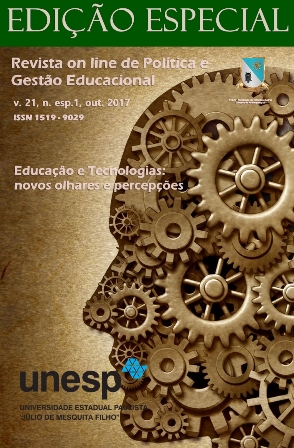THE DEVELOPMENT OF THE REASON IN THE AGE OF TECHNOLOGY: COGNITION X INDOCTRINATION
DOI:
https://doi.org/10.22633/rpge.v21.n.esp1.out.2017.10456Keywords:
Cognitive reasoning. Indoctination. Archetypes. Anthropology. Philosophy of education.Abstract
The teachers education in the current universe of technologies and the need to obtain students capable of thinking and thinking for themselves has been a constant challenge and difficult to overcome for many teachers at all levels of education. The competition of the school with the media, if on one hand helps the student´s life; On the other hand, it puts them away from the possibility of deeper researches, from contact with a physical library, since the superficiality of the themes offered by the Internet often assumes this role, making difficult to develop logical reasoning and their own capacity to write with clarity, cohesion and creativity. But how can we produce quality texts if the student is not trained to exercise the dialectic and does not have content to do them so? The researches which have been developed by us over the last twenty years, based on the concern with the quality of teaching, are based in particular on the teacher's ability to lead the student to reflection, creating a cognitive network that is not directly linked to dogmatic teaching, which is capable to reduce their vision. The educational reform recently proposed by the government proposes a school without indoctrination, however, many teachers feel incapable of finding a way to help their students to be more critical and observant, since many History, Geography or even Philosophy manuals present a clearly Marxist tendency. How to lead the student to reflection, without being led by doctrinal paths? How to get him to reflect on the problems in which he lives in, in order to distinguish a rational thought from a biased one, if the world around him, the media, especially the internet, provides him with clearly doctrinal bases? In this article we will try to present ways that either was useful for the formation of Pedagogy teachers or in the work with high school students, aiming the development of their capacity for reflection. Based on Psychology (BETTELHEIM, 1980; JUNG, 2008) in the Philosophy of Education (LIPMAN, 1994), in the anthropology (ELIADE, 1972; CAMPBELL, 2013) and in the Classical Philosophy (PENHA, 1994), we will present our approach to training critical and questioning students.Downloads
References
BETTELHEIM, B. A psicanálise dos contos de fadas. Rio de Janeiro, Paz e Terra, 1980.
BLOOM, H. Dumbing down American readers. Editorial. The Boston Globe, set/2003. Disponível em: http://archive.boston.com/news/globe/editorial_opinion/oped/articles/2003/09/24/dumbing_down_american_readers/. Acesso em: 20 maio 2017.
BYATT, A. S. Harry Potter and the Childish Adult. The Opinion Pages. The New York Times, July, 07, 2003. Disponível em: http://www.nytimes.com/2003/07/07/opinion/harry-potter-and-the-childish-adult.html. Acesso em: 20 jul. 2017.
CAMPBELL, J. O Poder do mito. São Paulo, Palas Athena, 2012.
ELIADE, M. Mito e realidade. São Paulo, Perspectiva, 1972.
LIPMAN, M. A filosofia na sala de aula. São Paulo, Nova Alexandria, 1994.
MARTINS, Maria Angélica Seabra Rodrigues. Aprender a pensar: um desafio para a produção textual. Bauru: FAAC/Canal6, 2007.
MARTINS, Maria Angélica Seabra Rodrigues (org.). Educação, mídia e cognição. Bauru, Canal6editora, 2010.
PENHA, J. da. Períodos filosóficos. São Paulo, Ática, 1987.
REBOUL, O. A doutrinação. São Paulo, Universidade de São Paulo, 1980.
ROWLINGS, J. K. Harry Potter e a pedra filosofal (e outros). Rio de Janeiro, Editora Rocco, 2001-2007.
SILVEIRA, N. da. Jung: vida e obra, 6ª.ed. Rio de Janeiro, Paz e Terra, 1978.
SCHWARTZMAN, H. O bom professor. Coluna da Folha de S. Paulo. Disponível em: http://www1.folha.uol.com.br/colunas/helioschwartsman/2016/05/1773190-o-bom-professor.shtml. Acesso em: 20 maio 2016.
SNOOK, I. A. Doutrinação e educação. Rio de Janeiro: Zahar, 1974.
TATAR, M. Contos de fadas: edição comentada e ilustrada. Rio de Janeiro, Jorge Zahar Ltda., 2004.
VERGARA, S. C.; BRAUER, M.; GOMES, A. M. C. Z. Universidades corporativas: educação ou doutrinação? Revista de Administração Mackenzie, Ano 6, n.3, p. 167-191, 2005. Disponível em: http://www.redalyc.org/pdf/1954/195416195008.pdf. Acesso em: 20 jun. 2017. ISSN:1518-6776











